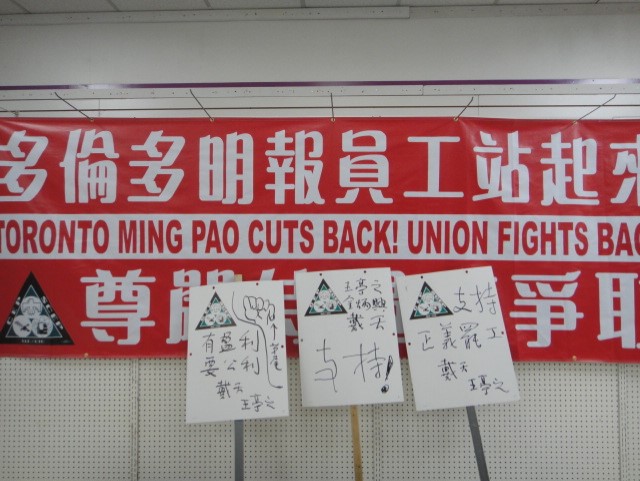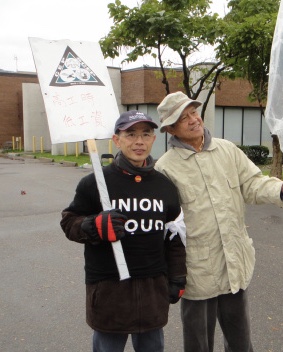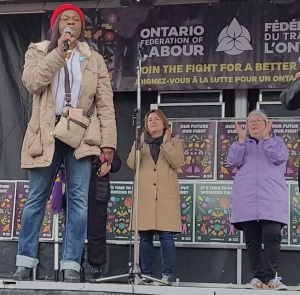林永長曾擬投訴:只准說英文,不准說中文!
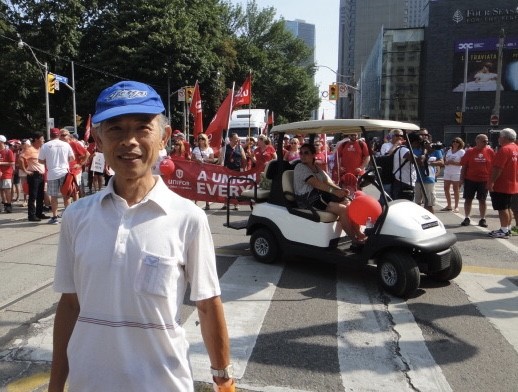
我是前多倫多明報工會副主席林永長,擁有二十餘年加拿大公務員工會(CUPE)會員資歷。因為一個珍貴機緣,很榮幸的參加並擔任「華工網絡」常委之一,迄今已有數個寒暑。
新冠疫情全面衝擊工商百業之前,我服務加國主要華文媒體多倫多《明報》將近23年半,在2018年初從資深翻譯的職位被裁退。 又迅獲另一較小報社聘用,擔任每日新聞編譯,直到2019年一月尾。
有機會見證三大華文報紙在加拿大創辦工會,個人深感自豪,從星島日報工會2000年5月成立,到前《世界日報》2006年8月設立工會,還有2010年9月誕生的明報工會。但我仍然期盼更多華裔社群明白「一人受害,眾人同傷」, 知道「有工會,能幫你」運用群體力量,爭取合理待遇、提高職位保障和改善工作環境,因為我始終相信: 「幸福不會白白送你,權益要靠自己爭取」。
在美國留學和工作多年之後,我與妻子帶著兩個小孩移民加拿大。因為初到多倫多人地生疏,起先在餐館打工一年當跑堂,後來進入《明報》任職新聞翻譯員。那時它從香港進軍加拿大沒多久,算是相對新到媒體機構,在多倫多進入第二年營運。 對我這個新移民卻是重要一步,畢竟家庭必須盡快在陌生環境安頓下來,何況傳媒工作性質亦符合個人興趣與目標。
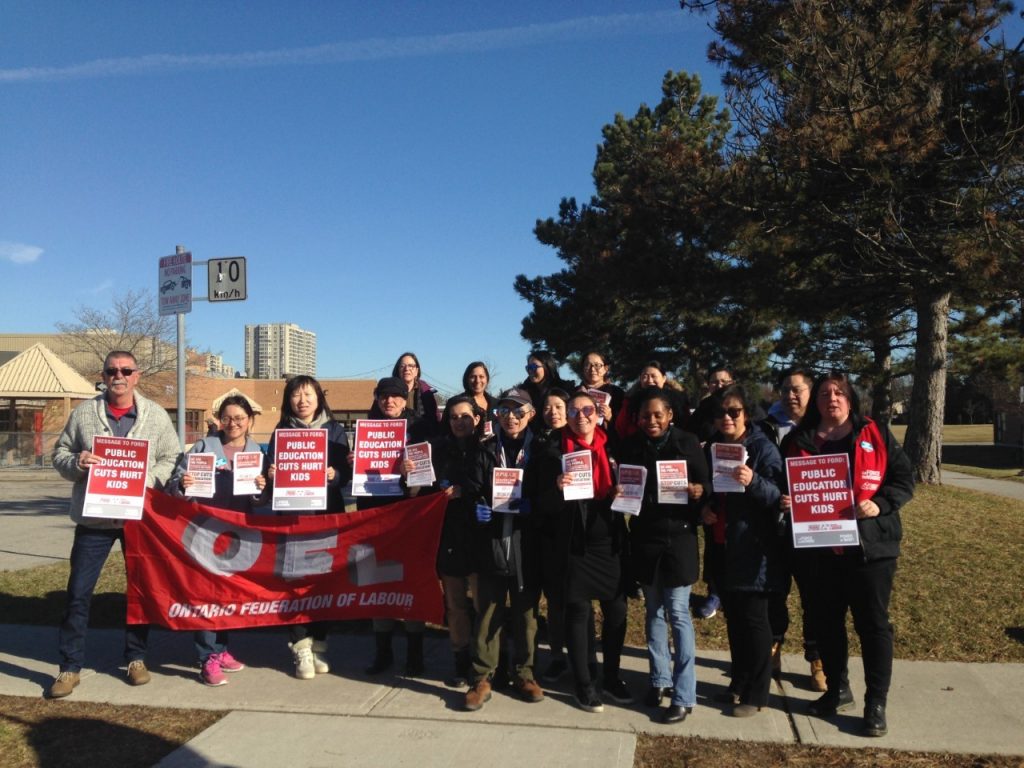
老闆道歉 取消投訴
舉家移民多倫多之前,我有短暫時間在加州阿拉米達為一個日本老闆做事。不知何故,有一天她的兩名資深日裔職員突然宣布,華籍員工必須說英語,不准講中文。我們覺得這個要求不合理,很快向管理層投訴但無結果。幾個人商量後決定一致行動,準備投訴到人權委員會。但在實際行動之前,我們給老闆表明意向。她立即道歉,並且說我們彼此之間可用中文談話,只是希望在前台範圍不要太大聲,以免擾及顧客。我們接受這個解釋,取消了原來的投訴計畫。
至今我依然印象深刻,領到第一張加拿大薪資支票那時刻,興高采烈到筆墨難以形容。等我仔細看明支票款額就傻眼了: 工資縮水,我發現每日工時被人少計。這是我抵埠以來第一份工作,剛剛上班兩周,還真不好意思找店主開口討錢。差額不大,只能算是一點零頭小數,可就覺得這事兒不公平。於是我致電安省勞工廳查詢,對方勸我繼續做下去,因為新移民在這裡找工不容易。他建議每天記錄準確工作時間,等我決定走人再回去找他。大約一年後我離職,勞工廳官員與我會晤僱主,根據我提出的工時紀錄,全數追回一年來每天短少的薪資。
有一次,我在多倫多瑪嘉烈公主醫院裡的走廊牆上,看到「護士工會布告欄」, 感覺十分震撼、特別羨慕。雖然只是那麼個小角落,在我看來卻代表一眾打工族的尊嚴,也意味著僱主尊重員工及其組織。我認為這樣的工作場所才是對的,於是立下心願,期盼有朝一日,為自己和同事爭取類似的職工園地,能夠毫無畏懼的談論勞權知識和公平職場信息。但實情是儘管有心卻孤掌難鳴,那時同僚與其它私企僱員一樣,沒人有興趣或不敢公開討論爭取權益之類的事情,更不用說改善福利和職場環境等工會話題。
個別工人形單影隻,面對資方,任何僱員均屬弱勢群組,唯有談判代表能替他們做出有效發聲。出國留學之前我原職公校小學教師,從1998年開始在多倫多教育局「國際語言項目」周末中文班任教。我驚喜的發現鐘點工資每年小幅提升,後來才得知,中文老師所屬的「加拿大公務員工會4400/多倫多教育人員工會」,有個談判小組與僱主達成一份多年集體協議,因為他們落力爭取,會員時薪按合約議定幅度逐年提高。那是我第一次體認工會集體力量,透過合約談判爭取公正與公平待遇,例如,獲得職場尊重、保障工業健康及安全、改善薪酬和福利。
同舟共濟的溫暖
工會提供及時財力支援,對於勞工運動扮演極關鍵角色。多數打工族最擔心,一旦參加罷工沒了薪資支票,家庭經濟中斷怎麼辦?多倫多明報職工為了首份集體合同而走上糾察線,剛開始情況不明朗,雖然有志一同,面對不可知未來,很多人為經濟問題而忐忑不安。但緊要關頭有好消息傳來,那時的「加拿大傳媒、電訊、紙漿工人工會87-M/南安省傳媒公會」帶了支票,派給糾察線的每個人作為罷工薪資. 對我們來說,這簡直是一場及時雨,個個如魚得水般,無比雀躍。南安省傳媒公會與CEP罷工基金提供的罷工支票,每周定時在糾察線派發,陪伴我們度過73個白天與黑夜,在冗長艱難時刻給姐妹兄弟提供經濟支柱,令人深深感受「一人受害眾人同傷」與同舟共濟的溫暖, 儘管我們那時尚未開始繳納會費。值得一提的是,罷工期間所得薪資支票,完全不用報稅。南安省傳媒公會甚至備妥免息貸款,任何罷工同事均可申請,應付緊急需要。
主流大工會資源厚、夠專業,擁有長期經驗,知道如何帶引弱勢工人策進勞權運動。它們的管事提供重要支援,協助人們在職場成立工會,從初始籌畫、揪團與秘密簽卡、何時公開運作及宣傳,到正式投票成立,還有其後可能的罷工行動,種種繁瑣細節都照料得無微不至。我們籌組工會那時情況也一樣,在南安省傳媒公會領袖協助下,從最早四人啟動,擴大到8人,然後成立12人籌組委員會,一直發展到絕大多數同僚響應而達成目標。在後來罷工期間,傳媒公會領袖不分晝夜支援我們, 避免走錯路,包括如何組織與動員、回應僱主威脅利誘,還有罷工總部每日運作開銷,尤其至關重要,協助我們最終贏得加拿大明報史上第一份集體協議。
首個集體協議既已到位,除了最重要提升薪酬與福利,工作場所諸多精靈古怪現象亦很快消失, 個別同事過去遭受不公平對待,立馬獲得改善。一般相信,有些經理作威作福或倒行逆施,大抵觸發同僚投入勞運及其後罷工,據聞管理層至少兩人不久遭無預警革職。經理從中汲取教訓,更加注意職業健康與安全準則,給部屬應有的尊重,避免違反安省勞工條例與法規。僱主前所未見舉措還包括張貼通告,多次公開提醒,絕不寬容任何職場騷擾,不論是一次性的或者重複違例。
不團結始終是加拿大華工運動的痛與最大困難之一, 必須想方設法克服。假如勞團核心小組能夠集結更堅實共識,一旦走上糾察線,會有相對較大勝算機率, 因為愈多人上陣,罷工愈快結束。
回顧2001年加國傳媒歷來首見星島日報罷工期間,大約二十多人跨越糾察線, 那次罷工持續將近七周。論者指出,星島罷工日數可以更短,假如只有十位工賊越線。相比之下,明報逾百僱員2011年尾罷工,在風吹雨打中苦戰達73晝夜,主要原因在於數十人繼續入廠開工,選擇背棄同僚, 未能同舟共濟。
從來罷工是被逼的,既然決定跨出這一步,就必須又猛又準。台灣華航空服員2016年6月投票授權工會採取行動,會員在授權投票後3天忽然下崗,管理層措手不及,同意空服員全部要求,破天荒的台灣民航罷工在24小時內落幕。 反觀我們的罷工2011年9月21日登場, 那是與管理層就首份協議開始合約談判的八個月後。冗長拖延已夠資方作好萬全準備,十拿九穩應對任何罷工或關廠情況。
很多僱主明顯反工會, 頑強態度或行為引致人們噤若寒蟬, 不敢參與勞團維權組織, 害怕管理層報復與秋後算帳。 我們贏得第一份集體合約而結束11周罷工, 香港總部派了一名高層到多倫多, 他在僱員大會宣稱,在亞洲他與勞團周旋經驗豐富, 懂得怎樣對付工會。果然資方開鍘不手軟, 而且耐心爆棚, 寧用大約7年時間一路整肅工會勢力。 截至我於2018年初離職, 估計公司起碼為此耗費一百萬加元, 包括資方在仲裁庭全部敗訴個案賠償款、重組為名斬除勞權份子的一波接一波裁員、 離職金和福利。
難脫重資方輕勞方思想
有些華人難脫過去原籍地重資方、輕勞方思想, 在不少群組同樣根深柢固。他們可能被誤導, 或者不盡了解加國勞工運動真實意義。想要破除所有迷思, 最簡單是普及教育宣導, 培養正確觀念,讓華裔社區更容易取得充足資訊, 認識加拿大勞工關係法律, 能夠保障他們的職場權利和就業標準如健康及安全等切身議題。
勞工運動長期需要更多堅定擁躉, 經常費時費力, 家人支持極為重要。至少這於我是個挑戰, 一直覺得遺憾。 在加拿大新家園落戶之後, 我才開始熱衷勞運, 家人迄今仍不認同我的親工會立場。對於一個長期活躍份子而言, 問題不大, 只是難以置信。 但其他人可能有困難, 家人不友善立場很大程度會拖住他們, 以至於他們不願參與職場維權行動。
另一方面,假如打工族在職場遇到麻煩, 知道具體到何處尋求援助, 他們會更有信心, 願意挺身捍衛自身權益。 我早先提及那家較小報社, 後來拖欠幾個月工資, 我聯繫「華工網絡」與「多倫多平權會」, 迅獲轉介至「華越柬寮法援中心」。那裡的法律顧問了解情況後提出寶貴意見, 包括如何再回去找僱主討論欠薪問題。她也建議, 同時向安省勞工廳報告並備案。不久,公司寄來支票, 全數償清所有拖欠工資。
David Lin once planned to complain: only to speak English, not Chinese!
My name is David Y. Lin 林 永 長 with CUPE membership since 1998. Right now I am also a proud Chinese Workers Network standing committee member in Toronto. Most recently I enjoy pretty much a happy semi-retired lifestyle.
Before all the COVID-19 pandemic impacts ramping up, I had worked with Ming Pao Daily News Canada for more than 23 years and was laid off as a senior translator in 2018. Then I worked for a smaller media outlet to translate daily news until January 2019.
It’s my great honour to witness Chinese-Canadian media workers get unionized in Toronto, namely, Sing Tao Daily in 2000, now-defunct World Journal in 2006 and Ming Pao in 2010. Still, I hope more people get the message that “One hurts, everyone suffers” and Union Can Help if you need a collective power to fight for issues like improved wages, job security and working conditions. I strongly believe it’s yours to earn when it comes to employment benefits. They don’t come for granted.
After several years of study and work in the States, I and wife immigrated to Canada with two kids. My first job here was in a restaurant and later a news translator position at Ming Pao Daily, then a relatively newer media company just went into its second year of business in Toronto. That’s a big step for me not only because it allowed my family to settle down sooner in a new country but also the nature of work fits my career goal well.
During the last months before coming to Toronto, I had worked temporarily for a Japanese boss in Alameda, California. Her senior Japanese staff had once announced that Chinese employees should speak English and were not allowed to speak Chinese. We complained to management but nothing was done. Each of my Chinese colleagues quickly agrees in solidarity to take the matters to the Human Rights authority. But before that, we made our intention clear to the boss. She finally apologized, saying we could speak Chinese with each other but just not too noisy when working in the front area where customers are present. We decided to accept that position and cancelled our action plan.
I received my first-ever pay cheque in Canada with tremendous excitement, only to find it a bit short on work hours. As a new immigrant, I did not dare to challenge that little difference since that’s for my first two weeks on the job. Nevertheless, I called the Ontario Ministry of Labour soon because I felt it’s simply unfair. The officer suggested that I keep working there since it’s not easy to find a job for newcomers. In the meantime he advised me to record my work hours and come back in a year or whenever I decide to go. About a year later I left the job and called the Ministry. They arranged a meeting with the business owner to present my working hours record. The boss agreed to top up the underpayments on every single day I’d worked there.
I was very impressed to see a nurse union billboard in the hallway when I visited Toronto Princess Margaret Hospital. To me, it represents nurses’ dignity in the workplace and sound respect from the employer. That small billboard on public space has inspired me so much that I could not help but think of establishing one for my colleagues in the future. But back then in 2007, like most workers with private companies, virtually no colleague would openly talk about the union or fighting for better pay and working conditions, among other things.
The bargaining team represents a meaningful authority to speak for individual workers. I was a primary school teacher by training overseas and started to work for the Toronto education board at its International Language Program in 1998. Later I found my hourly pay increased gradually each year according to a schedule stated in a collective agreement, thanks to the hard work of a CUPE 4400 bargaining team. That’s the first time I’d admired the union power that would fight for fairness and justice including improved wages, respect, health and safety and benefits.
Unions believe in the fact that an injury to one is an injury to all. It would provide dire needed financial support and that plays a key role for labour movements. One of the main concerns facing most workers is the possibility of losing income when you walk out of your job. This is true for Ming Pao employees when they started the month-long strike in September 2011 in order to win their first contract. To many workers’ surprise, however, the then CEP Local 87-M Southern Ontario Newspaper Guild (SONG) had delivered cheques to everyone on the picket line as their strike benefits. The weekly cheques paid out of Local and CEP Defend Funds provided a real lifeline rescuer during difficult times of income interruption although we were not paying the membership fee yet. It’s even sweeter when we learned that the strike pay is tax-free. As well, the Guild had interest-free loans available should any striking member require an urgent situation.
Large mainstream unions have strong experience with solid resources when it comes to helping vulnerable workers organize. They have well-trained leadership forces to guide workers on all steps for their union drive and how to actually go on a legal strike, just to name a few. In the Ming Pao newspaper case, their knowledgeable staffers would help our organizing team avoid common errors and ensure everything was on track to finish a successful mandate. It covered all expenses incurred to manage the daily business during the strike.
Lots of unfair practices changed in a timely manner when a collective agreement was set in. For example, undue treatments of staff by management got improved. It was believed that ill-mannered supervisors and undue oppressions most likely ignited the fire for the Ming Pao union drive and the subsequent strike. After that, they learned how to act appropriately in office to avoid breaching Ontario’s labour law and regulations. The company posted specific notices to reiterate that any form of workplace harassment will not be tolerated by it as a one-time incident or repeat occurrence.
Lack of solidarity is a top hurdle Chinese-Canadian unions must overcome. Just over 20 workers crossed the picket line when Sing Tao newspaper employees went on strike in 2001. Their job action ended after 47 days. The strike could be much shorter should the number of scabs cut in half.
In contrast, the Ming Pao union strike bitterly lasted for 73 days in late 2011. The main reason for that was we had too many scabs on the employer’s side. A sharper united front among workers guarantees a strike to end more quickly. The organizing team should try to earn stronger mutual support within the workforce as much as possible before the strike actually begins.
You have to strike hard and swiftly if you really mean a strike. China Airlines flight attendants abruptly walked out in June 2016, just 3 days after union members voted to authorize the strike mandate. Taiwan’s first-ever airline industry action ended within a day after management had bowed to all demands by the union. Ming Pao workers walked to picket lines on September 21st,2011, eight months after parties had started the first contract negotiation talk. That’s way too long only to see the company be well prepared for a possible lockout or strike.
Obstinate anti-union positions by employers discourage workers from taking part in the organized efforts. After the 11-week strike ended, Hong Kong headquarters sent a representative to attend Ming Pao Toronto’s employee general meeting, declaring he knows very well how to deal with unions. The employer thereafter spent approximately one million Canadian dollars for the sole purpose of eradicating union forces within 7 years before I left the company in early 2018. That estimated amount of cost would include payments for all labour lawsuits it had to lose in the tribunal court, numerous waves to get rid of pro-union employees in the name of restructuring and massive layoffs with severance packages.
It’s no secret that anti-union sentiment holds steadfast as well among some Chinese populations due to misunderstanding, faulty information or poor knowledge regarding Canadian labour movements. Easier access to appropriate education would sweep out all the myths so that they have a better understanding of labour relationship acts and laws in Canada including workers’ rights and employment standards like health and safety issues.
Family support is important to workers who chose to join union forces. Unfortunately, it’s not always the case, at least from my own experience. As a long-time activist, it’s hard to believe that up to nowadays no family member is comfortable with my involvement in the labour forces. Some workers may be hesitant to jump on the bandwagon because of similar difficulties arising from the family’s unfriendly manner toward trade unions.
Knowing where to get assistance would provide confidence for workers to fight for their rights. The smaller media outlet had stopped pay cheques for several months at the end of 2018. I asked the Chinese Workers Network and CCNCToronto for help. They referred the matter to the Chinese & Southeast Asian Legal Clinic where I got prompt assistance including how to talk to the boss in person one more time about the delayed payment. At the same time, I filed a claim with the Ontario Labour Ministry as advised. Shortly later the company issued a cheque to cover all the wages previously owed.
